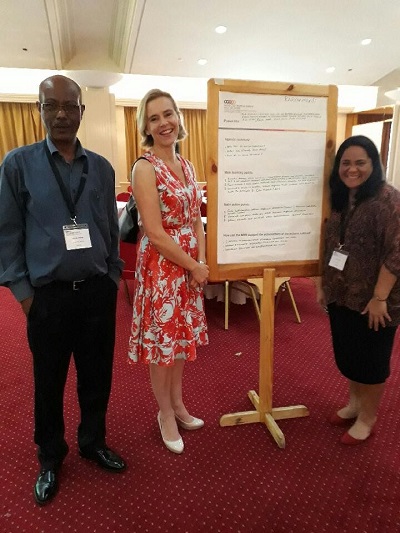The last decades has seen unprecedented effort by the international community to control, and ultimately eliminate neglected tropical diseases (NTDS). Billions of Dollars have been spent on treatment of NTDs and impressive achievements have been recorded, some NTDs being on the verge of elimination. Huge steps have thus been taken towards these goals, with the group of diseases addressed by preventive chemotherapy receiving particular attention. In 2016 one billion people received treatment for at least one of the preventive chemotherapy diseases (lymphatic filariasis, onchocerciasis, schistosomiasis, soil-transmitted helminths, trachoma), a landmark number in the fight against neglected tropical diseases. GIVEN
To tackle the problem of NTDs in a coordinated way, the Neglected Tropical Diseases NGOs Network was established in 2009. In September this year, the 8th NNN conference was held in Dakar, Senegal, and was attended by over 300 delegates, representing 49 countries and 100 organisations. The conference was hosted by Helen Keller International and was opened by Dr Wendy Harrison, Chair of the NNN and Executive Director of the Schistosomiasis Control Initiative as well as the Secretary General for the Senegalese Ministry of Health, Dr Ibrahima Wone. Fekadu Abebe from the University of Oslo had not only the chance to participate at this conference but was also tasked to represent both the Centre for Global Health at the University of Oslo and the Center for Global Health at the Technical University of Munich in the workshop on One Health and neglected zoonotic diseases, which he led together with Sarah Jayme from the Global Alliance for Rabies Control.

This year’s NNN conference marked a change in its organization and set-up, since the three days were designed to provide more time to actively work together in workshops, with the aim to generate solutions to the many challenges faced on the road to NTD control and elimination. The workshops discussed various issues relevant to the diverse group of neglected tropical diseases, such as: water, sanitation and hygiene (WASH), the sustainability of NTD programmes, the role of faith networks/institutions, quality assurance for diagnosis and surveillance of NTDs as well as the need for improving coordination of NTD control programs. Furthermore, specific NTDs were discussed, such as a separate workshop for skin-related NTDs, trachoma and lymphatic filariasis morbidity. Importantly, topics concerning behaviour change, vector control and One Health were also discussed in these workshop settings, shining the light on the interplay of human and animal behaviour. With six sessions and 24 workshops overall, there was plenty of room to delve deeper into topics in small groups and thus achieve more concrete next step action points.
The 8th NNN conference was particularly interesting for three main reasons: First, because it focused on discussions on the challenges and action plans pertinent to NTD control programmes rather than relying on the traditional lectures and keynote speeches. Second, all workshops identified challenges of specific NTD programmes and outlined action plans as well as concrete support these programmes would require from the NTDs NGOs Network. Third, the issue of sustainability received attention by all conference participants and workshop groups, highlighting that this is a concern that is taken very seriously by the NTD community.
Finally, this year’s NNN meeting must be applauded for taking up the issue of One Health and zoonotic NTDs, an issue that had only received minor attention at the Global Partners Meeting on NTDs at the WHO in April this year. However, despite the fact that neglected zoonotic diseases constitute almost 80% of all NTDs, the fact that fewer than ten people participated at this particular workshops shows how much work still lies ahead. The importance of addressing the human-animal health relationship should be emphasized not only by its respective constituency but represents also an important task of the NNN.
